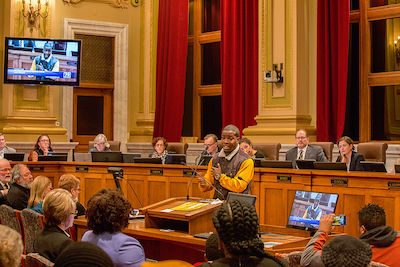Transcript: Community Broadband Bits Episode 240
This is the transcript for episode 240 of the Community Broadband Bits Podcast. Christopher Mitchell speaks with Darren Farnan of United Electric Cooperative in Missouri. The electric co-op has undertaken a fiber project to bring high-speed Internet service to their members. Listen to this episode here.
Darren Farnan: We're seeing almost 70 percent of our customers either take 100 Mbps service or above. That's telling the story of what that real demand is out there.
Lisa Gonzalez: This is Episode 240 of the Community Broadband Bits Podcast from the Institute for Local Self Reliance. I'm Lisa Gonzalez. It seems like every day we learn of yet another electric cooperative bringing high quality connectivity to rural communities. In areas with low population density, national providers don't offer high speed service and electric cooperatives are already offering electric services, so providing fast, affordable Internet access is often the next logical step. In this interview, Christopher talks with Darren Farnan, Chief Development Officer of United Electric Cooperative in Missouri. The Cooperative is working on a fiber project and in addition to talking about that, the guys discuss the logistics and financing of bringing fiber to very rural areas. Darren also gets into why it's so important and why cooperatives are picking up the slack where national providers won't serve. You'll hear Darren use the term ILEC. If you're not familiar with the term, it's an acronym for Incumbent Local Exchange Carrier. It's a telephone company that's already established and providing telephone service in a local area.
Christopher Mitchell: Hey folks. This is Chris Mitchell, the host of Community Broadband Bits. I just wanted to ask you if you could do us a real big favor to help us spread this show around. That's to jump on iTunes or Stitcher, wherever you found this show, and to give us a rating. Give us a little review, particularly if you like it. If you don't like it so much, then maybe don't do that, but if you're enjoying the show, please give us a rating and help us to build the audience a bit. Thanks.












